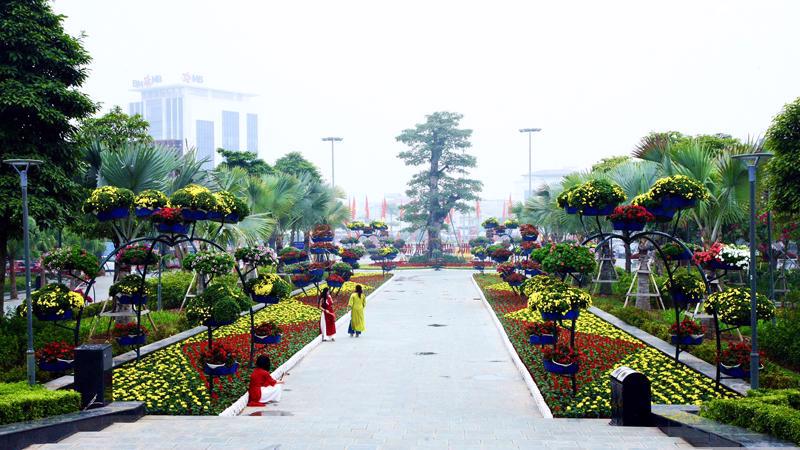Hai Phong was one of the first localities in Vietnam to approve an action plan on implementing the national strategy on green growth in 2014. What has it done over the past decade to implement the strategy?
As a member of the most dynamic economic development triangle in the country’s Red River Delta, of Hanoi - Hai Phong - Quang Ninh, the city holds a unique economic position, with a transport network that consists of roads, railways, airports and, particularly, coastline, making it an important gateway to the Red River Delta, the northern midland and mountainous region, and the south of China.
It set a green growth target many years ago, and has been implementing this in a systematic, persistent, and scientific manner. The city gives priority to developing green industry and eco-industrial real estate, including industrial parks, that meet sustainable and environmentally-friendly standards and requirements for greenhouse gas emission reductions. The city has policies in place to encourage investors to use renewable energy, including wind and solar energy, as well as environmentally-friendly production technology.
Among the 14 industrial parks (IPs) in Hai Phong, covering 6,080 ha, the DEEP-C and Nam Cau Kien IPs are to be developed into eco-IPs. Invested in by a Belgian business, DEEP-C has been operating for 25 years and has attracted $5 billion in investment capital to date.
The city’s economic scale ranks it sixth among Vietnam’s 63 cities and provinces, and its GRDP growth of 10.34 per cent in 2023 ranked it fifth nationwide. FDI attraction last year, meanwhile, reached a record $3.5 billion; the second highest in the country.
Its investment and business environment indexes have remained stable and put it among the leading group in the country. Of the 63 cities and provinces, Hai Phong ranked third in the Provincial Competitiveness Index (PCI), second in the Public Administration Reform Index (PAR Index), tenth in the Satisfaction Index of Public Administration Services (SIPAS), and 15th in the Provincial Governance and Public Administration Performance Index (PAPI).
Hai Phong has consistently followed a green economic growth path over the last decade. What new orientations and solutions will the city take in the years to come to fulfill even greater goals?
Hai Phong has built an urban development plan for a green and modern seaport urban area, an economic urban area, and an eco-urban area in line with green growth targets. Under the plan, a Southern Economic Zone on a total area of 22,000 ha is to be developed within the city. Meanwhile, 25 more IPs, covering 15,777 ha, and 26 industrial clusters, covering 1,098 ha, will be established in line with the city’s master plan for 2021-2030 with a vision towards 2050.
We have regularly proposed that investors, especially foreign-invested enterprises (FIEs), accompany the city in its green growth efforts, renew their technology and apply advanced and green technology, save energy, use renewable energy, and reduce greenhouse gas emissions.
In addition to developing standard IPs, Hai Phong has also tapped its maritime advantages to develop renewable energy, particularly waste-to-energy and offshore wind power.
In choosing to pursue a green economy and knowledge-based economy model, Hai Phong will focus on human resources training, attract talent, develop a startup and innovation ecosystem, and connect universities and research institutes with businesses to promote the study, development, and application of science and technology. As a result, Vietnamese workers will be able to master important concepts such as design, production, and commercialization.
Hai Phong has the position and resources to implement its green growth targets. However, the city is also facing challenges, such as environmental pollution from production establishments and traffic congestion from its rapid urbanization and mechanization. How will it deal with these challenges?
Any city or province will encounter such challenges on the way to sustainable green growth. As a heavy industrial city, Hai Phong has paid more attention to improving its environmental quality. In the 2016-2020 period, water quality improved greatly while air quality was often measured within the average to good levels.
We have resolutely removed all production and service establishments from the city’s central area that cause environmental pollution, and controlled other sources of environmental pollution, helping to improve the environment in urban areas, industrial clusters, and craft villages.
In transportation and seaports, we are changing from transporting small volumes of goods by road to transporting huge volumes by container. We also promote the transportation of goods by rail, sea, and inland waterway, in order to build a city of green ports.
In agriculture, Hai Phong is implementing a closed-loop production model, reusing and recycling agricultural waste, by-products, and residues. Focus has also been placed on improving forest quality and managing forests sustainably, particularly in the Cat Ba Archipelago, which is a World Heritage Site. Hai Phong has implemented a zero-waste agriculture model in the archipelago for many years.
The city has approved a project on building an environmental monitoring center, and automated environmental monitoring stations are to be installed with advanced and modern technology.









 Google translate
Google translate